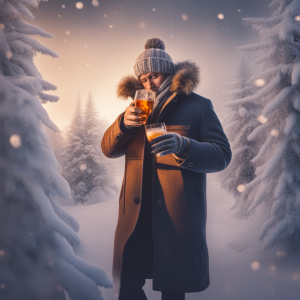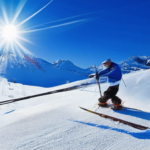Understand the Dangers of Alcohol Consumption in Frigid Winter Conditions
As winter envelops us in its icy grip, particularly in severe cold regions, many individuals instinctively turn to alcohol for a sense of warmth and comfort. However, it is vital to recognize the substantial risks linked to this choice. This article will delve into the dangers associated with drinking alcohol in harsh winter climates, highlighting why this practice is not only perilous but also ineffective in maintaining proper body heat. By familiarizing yourself with these risks, you empower yourself to make informed decisions that prioritize your safety and well-being as you navigate the treacherous conditions of winter.
Before exploring the associated dangers, it's crucial to debunk the widespread myth that alcohol acts as a warming agent. When consumed, alcohol induces dilation of blood vessels close to the skin's surface, which can create a misleading initial sensation of warmth. However, this superficial warmth does not contribute to the vital process of maintaining a stable internal body temperature. Ultimately, the effects of alcohol can be detrimental, undermining your resilience against the cold and significantly elevating your risk of life-threatening conditions such as hypothermia and other serious health issues.
 One of the most alarming consequences of consuming alcohol in cold conditions is the increased risk of dehydration. Alcohol functions as a known diuretic, encouraging the body to expel more urine and, consequently, leading to significant fluid loss. Additionally, the cold air typical of winter months is often drier, exacerbating moisture loss from our bodies. When these elements combine, the result is dangerously low hydration levels, which are essential for sustaining overall health and survival. Not only does dehydration impair physical performance, but it also adversely affects cognitive functions, making it difficult to think clearly and make sound decisions in critical situations.
One of the most alarming consequences of consuming alcohol in cold conditions is the increased risk of dehydration. Alcohol functions as a known diuretic, encouraging the body to expel more urine and, consequently, leading to significant fluid loss. Additionally, the cold air typical of winter months is often drier, exacerbating moisture loss from our bodies. When these elements combine, the result is dangerously low hydration levels, which are essential for sustaining overall health and survival. Not only does dehydration impair physical performance, but it also adversely affects cognitive functions, making it difficult to think clearly and make sound decisions in critical situations.
Recognize How Alcohol Affects Your Judgment and Awareness in Cold Environments
Another significant drawback of alcohol consumption is its ability to hinder cognitive function and decision-making. In challenging survival scenarios, the ability to make clear, rational judgments is paramount for ensuring safety. Alcohol can cloud your judgment, making it increasingly challenging to respond aptly to potential hazards. This compromised ability to reason can lead to accidents and poor choices, which could have dire outcomes when confronted with extreme cold. Staying alert and aware of your surroundings is crucial; however, alcohol undermines this necessity, resulting in a higher likelihood of errors that could jeopardize personal safety.
Furthermore, alcohol consumption can severely disrupt the body's natural temperature regulation mechanisms. When ingested, alcohol causes blood vessels in the skin to expand, which leads to increased heat loss. While this may provide a temporary sensation of warmth, over time, it accelerates the loss of essential core body heat, vital for survival. This creates a dangerous cycle where the fleeting warmth quickly gives way to a significant drop in core temperature, heightening the risk of life-threatening conditions such as hypothermia. It is essential to understand that although alcohol may seem like a quick solution for combating the cold, it ultimately increases your vulnerability.
Explore the Alarming Link Between Alcohol Use and Hypothermia Risk
When discussing the potential for hypothermia, it is critical to grasp how alcohol consumption can mask the early warning signs of this perilous condition. Hypothermia arises when the body's core temperature drops below the normal range, typically below 95 degrees Fahrenheit (35 degrees Celsius). Symptoms can manifest as shivering, confusion, fatigue, and impaired coordination. However, alcohol suppresses our body's natural responses, making it increasingly difficult to identify these vital indicators. By the time hypothermia symptoms become apparent, it may be too late to avoid severe injury or even life-threatening outcomes.
In winter survival scenarios, there are numerous safer and more effective methods to maintain body warmth without resorting to alcohol. Here are several strategies that can significantly enhance your ability to stay warm and safe:
1. Layer Your Clothing for Optimal Warmth: Wearing multiple layers of clothing is essential for effectively trapping warm air. Start with thermal base layers, add insulating mid-layers, and finish with a windproof and waterproof outer layer to create a protective barrier against the cold.
2. Ensure Your Clothing and Footwear Stay Dry: Moisture can expedite heat loss, so it’s crucial to keep your clothing and footwear dry at all times. Selecting waterproof materials and changing into dry garments when necessary will help retain warmth.
3. Insulate Yourself from the Cold Ground: Utilizing sleeping mats or insulation pads can significantly minimize heat loss, especially during rest periods. This step is vital for conserving body heat when spending extended time in cold environments.
4. Choose Warm, Non-Alcoholic Beverages: Instead of turning to alcohol, opt for hot beverages such as tea, coffee, or hot chocolate. These drinks provide warmth without the adverse side effects linked to alcohol consumption.
5. Seek or Construct Shelter for Protection: Proactively finding or building a shelter can greatly reduce exposure to harsh winds and freezing temperatures. An adequately built shelter is instrumental in retaining body heat, significantly boosting your chances of staying warm.
6. Fuel Your Body with Nutrient-Dense Foods: Eating foods rich in calories can provide your body with the energy required to generate heat. Foods like nuts and fatty fish are excellent sources of healthy fats that can be particularly beneficial in cold conditions.
Gaining a thorough understanding of the risks that accompany alcohol consumption in freezing temperatures is vital for anyone involved in winter survival situations. Despite the temporary sensation of warmth, alcohol can lead to dehydration, cognitive impairment, hindered temperature regulation, and can mask the symptoms of hypothermia. By avoiding alcohol and implementing safe, effective strategies, we can enhance our chances of surviving and thriving in harsh winter environments. Stay alert, prepare extensively, and prioritize your safety above all else.
The post Hazards of Alcohol Consumption in Extreme Cold Conditions appeared first on Survival Bite.
The Article Alcohol Consumption Hazards in Extreme Cold Conditions Was Found On https://limitsofstrategy.com


This topic really hits home for me. I remember a few winters back when we had a big snowstorm, and my friends and I thought it would be cozy to sip on some whiskey by the fireplace. I left the house feeling all warm and fuzzy, but once I stepped outside, I quickly realized that the alcohol had fooled my body into thinking it was warmer than it actually was. It was a rude awakening!
I really appreciate the insights you’ve shared about alcohol consumption in winter conditions. It’s something I’ve often thought about, especially during the chilly months when the temptation to pour a warm drink can feel particularly inviting. I remember a winter hike last year, and several friends suggested bringing along some cider with a splash of whiskey “to keep warm.” At that moment, I was reminded of the myths we often perpetuate about alcohol’s warming effects, and I chose to stick with hot tea instead.
Your post raises a crucial point that isn’t often discussed, especially during the winter months when the temptation to reach for a warm drink can be quite strong. I’ve observed that many people do associate alcohol with comfort, and that might stem from cultural practices or social settings where drinking is prevalent. However, your explanation of alcohol’s effects reminds us that what feels good in the moment can lead to serious dangers.
You bring up such an important aspect of our relationship with alcohol, especially during wintertime. The way we often associate warm beverages with comfort can sometimes blur the lines between what’s genuinely soothing and what might not be good for us in the long run. I’ve noticed how, in social settings, there seems to be a ritualistic nature to drinking—like a shared bonding experience that can almost feel like a cultural rite of passage.
You make a great point about the connection between alcohol and comfort, especially during the colder months. It’s interesting how our environment and cultural norms shape our habits. That warm drink instinct can be strong, but I think it helps to be aware of those moments when we might be opting for a drink out of routine rather than genuine desire. Finding alternatives that provide comfort—like a nice herbal tea or even just cozying up with a good book—can shift the mood without the negative fallout. It’s all about creating those rituals that feel good but are also uplifting. What kinds of warm drinks have you found that hit the spot without involving alcohol?